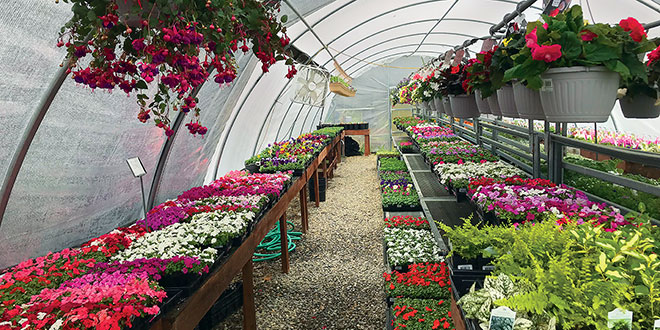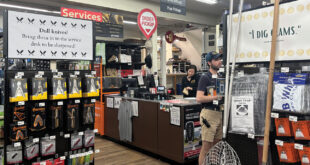To get additional insights into the customers who are seeking low-maintenance lawn and garden options and how to serve them, Hardware Retailing spoke to three retailers who operate extensive garden centers as part of their home improvement businesses.
American yards are shrinking. According to the U.S. Census Bureau, newly constructed single-family homes are taking up a larger percentage of lots, and lots are the smallest they have been since the 1970s. Generally, the data shows that in recent years, homebuyers have chosen more interior square footage over a larger yard.
In addition to opting for smaller yards, many people are moving to the city. According to a 2018 United Nations report, 82 percent of North Americans live in urban areas. While there isn’t specific data that points to how much work residents want to put into their yards regardless of their size, a correlation could be made between choosing smaller lots and an increased demand for low-maintenance lawn and garden solutions.
No matter how involved your customers want to be in their outside spaces, it’s important to educate them about their options. There are also opportunities to build add-on sales and transaction sizes within this customer segment.
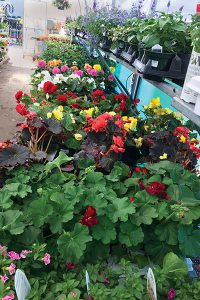
Seasonal Limitations and Opportunities
Small yards, short growing seasons and homeowners’ preferences for low-maintenance outdoor spaces may seem like barriers to retailers selling lawn and garden products. However, retailers whose operations focus on customers who are certified green thumbs can just as easily find solutions for customers who don’t want to invest a lot of time in their yards.
Despite the short growing season in Damariscotta, Maine, which starts in March and generally peaks in June, Damariscotta Hardware runs a vast lawn and garden operation. Residents may not want to invest too much time and effort into their lawns and gardens, but that doesn’t mean they don’t want them to look nice during the brief season.
“If we had a longer season, people in this area might be more passionate about their gardens,” says Damariscotta Hardware manager Dylan Ruggiero. “The season fizzles out quickly, which impacts how much effort people want to put in.”
To combat some community members’ low interest in long-term lawn and garden maintenance, Damariscotta Hardware took on the hard part. The operation has three greenhouses, which allows the staff to start the planting season in early March and cultivate plants that otherwise wouldn’t be ready until later in the spring or early summer. The garden staff starts many plants from seeds, and they also receive some as transplants from vendors.
Cultivating Care
Some customers may want to lessen their lawn and garden load to be more eco-friendly by limiting water usage and avoiding potentially harmful fertilizers.
One option Karen Henderson at Goffstown Ace Hardware has seen grow in popularity in recent years is using clover instead of traditional grass. It’s shown to benefit the earth and the bee population.
For more information about eco-friendly solutions to suggest to your customers who want low-effort, green options, click here.
The growing season is similarly short in Goffstown, New Hampshire, where Goffstown Ace Hardware operates Sandy’s Garden Center. Sandy’s also includes a greenhouse on the property, but it is used for caring for plants outside the traditional growing season, not starting seeds or transplants. They start transitioning plants outside the greenhouse around Easter, but generally their season starts in mid to late April.
“We try to be a go-to place for lawn and garden because there are a lot of other garden centers in our area,” says store manager Karen Henderson. “We stock many options for people, items that are different or interesting. We use local suppliers because we know they will sell us things that are proven to grow well in our area.”
The climate in Maple Valley, Washington, is more moderate than on the East Coast, which allows the garden center at Johnsons Home & Garden to be open longer throughout the year.
Johnsons operates a 4,000-square-foot greenhouse, which is open all year. The exterior garden center is open from March to September, depending on the timing of the last frost. The rest of the department includes 2,300 square feet outside for live goods and space inside the store for packaged products and to showcase the store’s large variety of house plants and succulents during the winter.
“We buy only top-quality live goods,” says garden center manager Doug Kelly. “I’m fairly fussy about who I buy from. I buy the best of what my suppliers grow. My suppliers know what to ship to me. If I don’t like what I see, I put it back on the truck.”
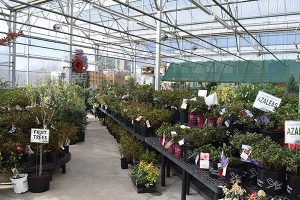
Solutions for the Ages
Ruggiero says a strong percentage of Damariscotta’s residents are older and aren’t permanent residents, only spending their summers at their vacation homes. While those customers still want to care for their properties, they tend to prefer less intensive lawns and landscaping and want equipment that requires less maintenance, too.
Damariscotta Hardware sells a line of battery-powered equipment that is popular with older residents who don’t want the upkeep of gas-powered equipment. Battery-powered equipment also generally weighs less than gas-run counterparts, which is preferable for older customers.
Robotic mowers in particular have drawn the interest of older customers and the operation’s small contingent of millennial customers.
“We use our robotic mower out in front of our store,” Ruggiero says. “It catches people’s eyes because it requires less maintenance than a traditional mower, and it mows the grass for you.”
Johnsons serves a variety of customers, including city-dwelling renters, suburban homeowners and people who live closer to the base of Mt. Rainier, where the wind and cold can have a significant impact on plant life.
Low-Maintenance Top-Sellers
Annuals
“Our top sellers are annuals because they are generally less expensive and customers want something to dress up the house. It’s important to have a wide selection of plants that grow in a variety of conditions and flower almost all season.”
—Karen Henderson, Goffstown Ace Hardware
Perennials
“Perennials are great for customers who want low-maintenance options because they come back every year. And when we’re the ones growing them from starts, there is even less maintenance and initial care required.”
—Dylan Ruggiero, Damariscotta Hardware
House Plants
“We’ve seen an increased trend in succulents. We bring in hundreds of them and sell them like crazy. There has been a swing back toward house plants, too, such as spider plants and snake plants. We’re up 200 percent with house plants.”
—Doug Kelly, Johnsons Home & Garden
“We have customers who are recently retired, and we also have young families who don’t have a lot of time to spend taking care of a yard,” says nursery associate Joan Easton. “They are different groups, but they both want access to low-maintenance options.”
Easton says houses in the area have small yards, urban dwellers live in condos and retirees often choose smaller apartments.
Before recommending certain plants for customers who have limited space or want low-maintenance options, Easton says the first step is to find out what their space offers: shade versus sun, morning versus afternoon sun and how much time they want to invest in watering. After she’s determined that, she can recommend plants that grow well in those conditions without much assistance.
“The majority of people with gardens have raised beds, and those who have smaller balconies opt for container gardens,” she says. “Raised beds are the most common because there isn’t as much prep work required, you don’t have to fight as many weeds and you can grow just about anything in them.”
At Goffstown Ace, customers are drawn to the same low-maintenance options, no matter their ages. Henderson also recommends potted gardening or raised beds because they are easier to maintain.
“We have senior customers who don’t have the physical ability to take care of a large garden,” Henderson says. “They also don’t need as much fresh produce, so it’s easy for them to downsize their beds and still get a good yield.”
For her younger customers, Henderson says lawn and garden care is often more about educating children and less about having a lot to show for it. Small beds and potted vegetables are often smart solutions for these customers.
“Young families are focused on the experience for their children,” she says. “They get something out of it without having to do more than just take care of a few plants. The reward can be just as good as when you’re putting so much more into a huge garden.”
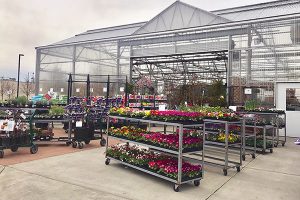
Higher Low-Maintenance Education
Henderson says young customers or people who are new to gardening can often lead to larger transactions because although they want something low maintenance, they may be just starting out and require a lot of new supplies. In order to build those larger tickets, it’s important for sales associates to have the necessary project knowledge to make sure each customer leaves the store prepared.
“People are willing to spend more on containers, raised beds and started plants,” she says. “With people who are new to gardening or lawn care, they don’t know everything they need. When we’re suggesting everything they need to be successful, there will be larger ticket sizes. Selling containers and started plants results in a higher basket than only selling a pack of seeds.”
In New Hampshire, Henderson says younger customers tend to show more interest in organic options, which helps increases the overall transaction size.
Kelly and Easton at Johnsons Home & Garden bring their expert knowledge and experience to the team.
Kelly ran his own nursery for more than 20 years before he sold the business and retired. He joined Johnsons in 2013 and brought with him the knowledge of running the nursery and the relationships he had built with local suppliers. He knows where to buy the best of each type of plant he wants to sell, and the suppliers are familiar with him, too.
He uses his decades of knowledge to teach customers what it takes to create the type of lawn and garden they want. He says that even if someone says they want a low-maintenance lawn, it’s important to explain to them that, initially, it will take some work.
“I tell people that if they want a nice lawn, it’s going to take time, period,” he says. “I explain exactly how to overseed their lawn: topsoil, grass seed, peat moss, and hide it from the birds. It’s like cooking. If they follow the recipe, they will have a nice lawn. I get a lot of ‘thank yous’ for my advice.”
Cultivating Care
If the climate in your area isn’t keen on keeping lawns green, your customers who prefer low-maintenance solutions have other options. In addition to rock gardens and artificial turf, provide resources on the plants that look great, but don’t require much maintenance. Visit TheRedT.com/lawn-options to find out what you should recommend to provide alternative groundcover solutions.
Easton was an avid hobbyist gardener who came to Johnsons as a part-time employee four years ago. She is a certified master gardener, a program she completed through the local university. (Learn more about what it takes to become a master gardener here.) Easton says her certification helps her every day at her job.
“Master gardeners don’t know everything, but we do know where to find the answers,” she says. “I use my certification frequently in my role, and it’s also a great benefit to have someone like Doug as a resource.”
When it comes to educating customers about lawn and garden solutions, staffing is crucial at Damariscotta Hardware. All staff members are trained in the department, which allows the operation to allocate additional staffing to the department in the spring and early summer. Ruggiero says it’s important to have a well-staffed and well-trained department, even during the down season.
“Having dedicated staff, even when the lawn and garden center isn’t up and running, is vital,” he says. “We spend time going through orders in the winter to determine what to buy for the next season.”
In addition to educating your customers, Henderson says it’s important to educate yourself in order to help customers find the best solutions for their needs. And when it comes down to it, the key to helping customers who want a little less to do in their yards is simple, Henderson says.
“You have to have a conversation with them and figure out the time and resources each customer is willing to dedicate to their lawn and garden.”
How to Turn Black Thumbs Green
Some customers want low-maintenance lawn and garden options because they don’t have time to devote to the caring and nurturing of green spaces. On the other hand, some customers just have black thumbs.
How can you serve customers who are beside themselves because they can’t keep their plants alive? Here are some ideas and resources for catering to customers who just can’t keep their lawns and gardens thriving.
 Recommend they start small.
Recommend they start small.
Customers who struggle to care for their lawn and garden spaces may just have too many things going at once. Suggest they start with just a few flower types in beds or one vegetable in a pot instead of a whole garden.
 Be understanding.
Be understanding.
People take great pride in their lawns and gardens, so it’s important for you to recognize how frustrating it can be for people who can’t get it right. Note returning customers’ challenges so the same suggestions aren’t made twice.
 Offer free soil testing.
Offer free soil testing.
Sometimes it’s not them, it’s the soil. In many regions, the pH of the soil can impact how well or even whether a plant takes root. Provide free soil testing to help your customers identify solutions to get back to growing.
 Create a support group.
Create a support group.
Start a Black Thumbs Club to help struggling gardeners. Create a Facebook group to share challenges and solutions, host vendors to demonstrate products and invite local gardening experts to speak at events.
 Hardware Retailing The Industry's Source for Insights and Information
Hardware Retailing The Industry's Source for Insights and Information



